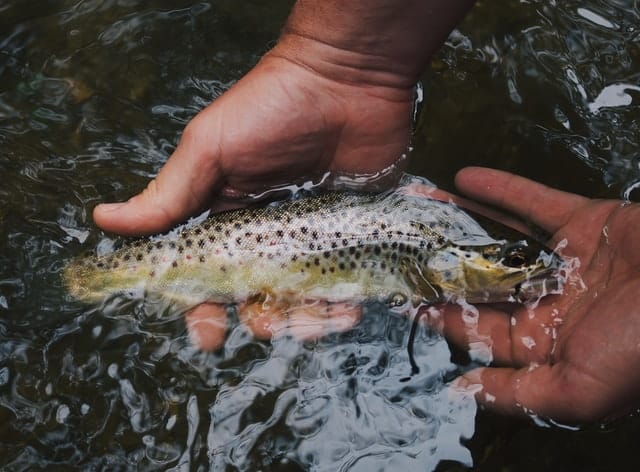The weather in spring can be unpredictable in the UK, with rain as likely as sunshine. This can sometimes put off any fishing hopefuls as they wait for warmer weather to head out for a fishing trip. Early in the season can be a great time to fish however; with the warming waters the trout will be active and shaking off their winter lethargy.
While here at Bewl Water we do offer boats for those who are heading out to fish on the reservoir to use, fly fishing is only available from the banks. All other forms of fishing should be practised from a boat. As Bewl is the largest reservoir in the South of England you will be spoiled for choice when it comes to fantastic fishing locations to set up in.
Be Prepared
If you haven’t used your kit since last season, then your equipment may be in poor repair as it has spent some time out of commission. Before heading out to fish, spend some time the day before going through your lines for cracks or tangles, your pole for rust or scratches and your flies and lures as well. Make sure you have everything you need prepared before the fishing season goes into full swing. If you find you have some pieces of equipment missing or broken you can buy new at the Bewl Water tackle shop, or you can rent any bigger pieces of equipment for the day so you can take you time finding a replacement.
Here are some important tips for preparing before heading out to fish for trout early in the season:
Remember Your Permit
Fishing on Bewl Water, and in many other bodies of water such as rivers or canals, requires each person fishing to have a permit. This is done to prevent the loss of too many fish from the reservoir and keep the stocks of native fish species high enough not to affect the ecosystem, as there are many water birds and other species like pike that feed on trout. Making sure you have your permit booked well ahead of your fishing trip can help you prevent a last minute scramble to get your permit before heading out. The permit you want will depend on whether you are interested in fishing purely for sport, where trout will be caught and released, or in keeping your catch. All permits, with your record of what you have caught, should be returned after fishing for the day.
Make a List
Having a look through your kit for something you need, only to remember that you have left it at home, can ruin your morning. Making sure you have a list of everything you want to bring with you (including extra layers in case it gets cold) will help you ensure that your early season fishing trip will go as smoothly as possible. If you are new to fishing as a sport, then our tackle shop has beginners’ packs to buy or hire, which contain everything you need to have a successful fishing trip.
Bring a shelter
Spring is a season of very changeable weather; a warm and sunny morning can easily transition into a wet and cold afternoon. Bringing warm clothes and a rainproof shelter will keep you from getting cold or wet while fishing. If you are uncomfortable while you are fishing it can drain away the fun and enthusiasm you have for the day’s fishing, so staying warm and dry is very important. While the weather is becoming warmer during spring, there are still cold snaps. Bringing a lot of warm layers and a waterproof will keep you cosy in case of inclement weather.
Trout fishing Tips
- Water Temperature – Water temperature can have a far bigger impact on the fishing season than many assume. The warmer the water the more active the trout is likely to be. In colder frosty weather the trout are unlikely to be active and may not feed, making it unlikely they will bite your fly near the surface. If the weather is cold, then using your fly to test deeper waters where the trout will be resting will be more likely to get you a bite.
- Observe – When casting out, consider where the trout are most likely to congregate. If you watch carefully you may even be able to spot a fish that has come close to the surface, as well as swarms of insects that may attract them. Keeping your eyes peeled is a great way to locate good spots to try for fish. If you are interested in bird watching as well as fishing you may spot some water birds around the reservoir as you fish.
- Keep Moving – In the early season trout tend to congregate together to keep warm. The shoals will have favourite spots in warmer parts of the water or in areas with plenty of cover. Sometimes if you are unlucky, your spot on the bank will not have any fish nearby; if you aren’t having any luck don’t be afraid to move your location to somewhere more promising. There are places around Bewl where fishing isn’t permitted, most prominently the nature reserve area. If you are unsure of where to set up on the bank, then requesting guidance from a member of staff or asking another person fishing will help guide you in the right direction.
- Pick your time – The weather is at its warmest during midday during the spring season, so this is when the fish and insects they feed on are most likely to be active. Rather than an early start, turning up in the late morning will ensure you are fishing during the period when the trout are most active, giving you a higher chance of success.
If you are planning on visiting Bewl Water for a fishing trip, then contact us here. Our staff will be happy to discuss what you will need for your trip. If you are missing any equipment, then visit our tackle shop to hire or select a replacement.

